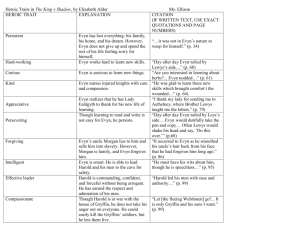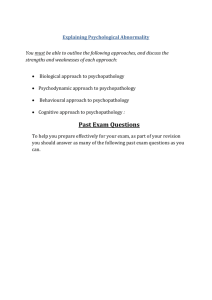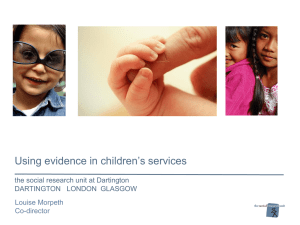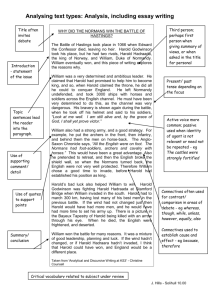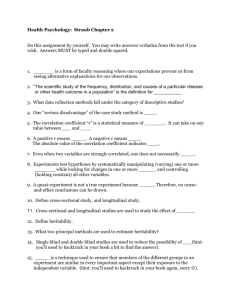DfE Topic 3 Child Development References Final_171014
advertisement
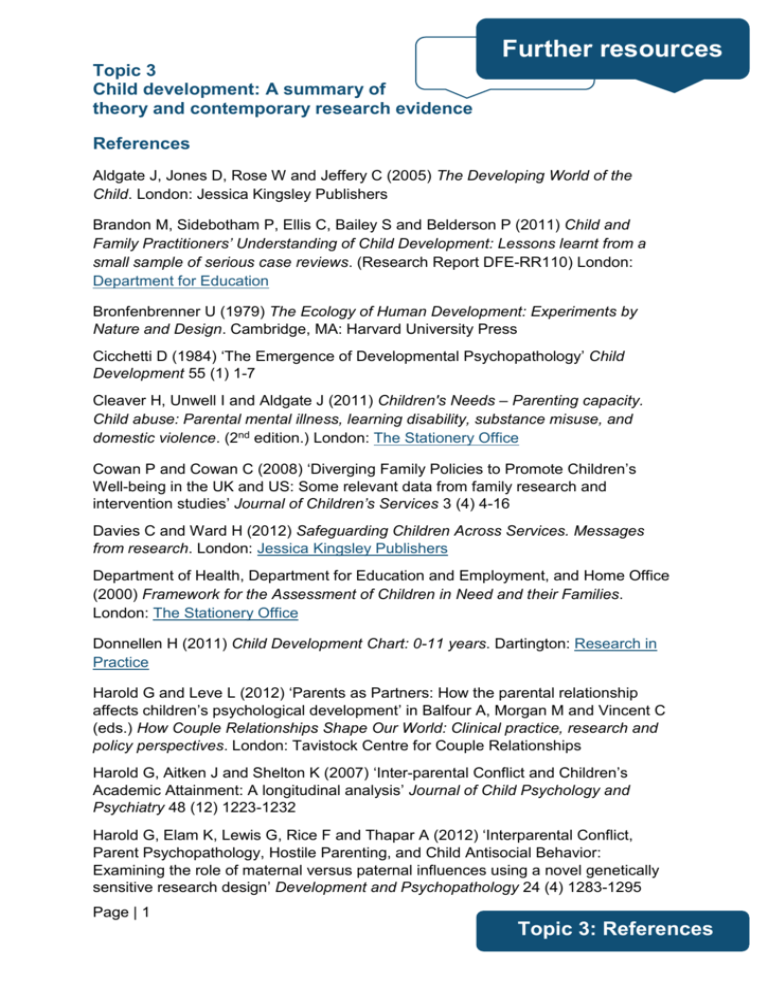
Further resources Topic 3 Child development: A summary of theory and contemporary research evidence References Aldgate J, Jones D, Rose W and Jeffery C (2005) The Developing World of the Child. London: Jessica Kingsley Publishers Brandon M, Sidebotham P, Ellis C, Bailey S and Belderson P (2011) Child and Family Practitioners’ Understanding of Child Development: Lessons learnt from a small sample of serious case reviews. (Research Report DFE-RR110) London: Department for Education Bronfenbrenner U (1979) The Ecology of Human Development: Experiments by Nature and Design. Cambridge, MA: Harvard University Press Cicchetti D (1984) ‘The Emergence of Developmental Psychopathology’ Child Development 55 (1) 1-7 Cleaver H, Unwell I and Aldgate J (2011) Children's Needs – Parenting capacity. Child abuse: Parental mental illness, learning disability, substance misuse, and domestic violence. (2nd edition.) London: The Stationery Office Cowan P and Cowan C (2008) ‘Diverging Family Policies to Promote Children’s Well-being in the UK and US: Some relevant data from family research and intervention studies’ Journal of Children’s Services 3 (4) 4-16 Davies C and Ward H (2012) Safeguarding Children Across Services. Messages from research. London: Jessica Kingsley Publishers Department of Health, Department for Education and Employment, and Home Office (2000) Framework for the Assessment of Children in Need and their Families. London: The Stationery Office Donnellen H (2011) Child Development Chart: 0-11 years. Dartington: Research in Practice Harold G and Leve L (2012) ‘Parents as Partners: How the parental relationship affects children’s psychological development’ in Balfour A, Morgan M and Vincent C (eds.) How Couple Relationships Shape Our World: Clinical practice, research and policy perspectives. London: Tavistock Centre for Couple Relationships Harold G, Aitken J and Shelton K (2007) ‘Inter-parental Conflict and Children’s Academic Attainment: A longitudinal analysis’ Journal of Child Psychology and Psychiatry 48 (12) 1223-1232 Harold G, Elam K, Lewis G, Rice F and Thapar A (2012) ‘Interparental Conflict, Parent Psychopathology, Hostile Parenting, and Child Antisocial Behavior: Examining the role of maternal versus paternal influences using a novel genetically sensitive research design’ Development and Psychopathology 24 (4) 1283-1295 Page | 1 Topic 3: References Further resources Topic 3 Child development: A summary of theory and contemporary research evidence Harold G, Leve L, Elam K, Thapar A, Neiderhiser J, Natsuaki M, Shaw D and Reiss D (2013) ‘The Nature of Nurture: Disentangling passive genotype-environment correlation from family relationship influences on children’s externalizing problems’ Journal of Family Psychology 27 (1) 12-21 King’s College, London, Florence Nightingale School of Nursing and Midwifery How children develop: principles and patterns of child development. Available online: http://keats.kcl.ac.uk/pluginfile.php/737715/mod_resource/content/1/page_07.htm Mannering A, Harold G, Leve L, Shelton K, Shaw D, Conger R, Neiderhiser J, Scaramella L and Reiss D (2011) ‘Longitudinal Associations between Marital Instability and Child Sleep Problems across Infancy and Toddlerhood in Adoptive Families’ Child Development 82 (4) 1252-1266 Munro E (2011) The Munro Review of Child Protection. Interim Report: The child’s journey. London: Department for Education National Scientific Council on the Developing Child (2009) Young Children Develop in an Environment of Relationships: Working paper 1. Cambridge, MA: Center on the Developing Child, Harvard University Open University, Department for Children, Schools and Families, Royal Holloway University of London and NSPCC (2007) The Developing World of the Child: Resource pack. Leicester: NSPCC Rutter M (1981) Maternal Deprivation Reassessed. Harmondsworth: Penguin Books Schofield G and Simmonds J (2013) Curriculum Framework for Continuing Professional Development (CPD) on Planning and Supporting Permanence: Reunification, family and friends care, long-term foster care, special guardianship and adoption. London: The College of Social Work Séguin L, Nikiéma B, Gauvin L, Zunzunegui M and Xu Q (2007) ‘Duration of Poverty and Child Health in the Quebec Longitudinal Study of Child Development: Longitudinal analysis of a birth cohort’ Pediatrics 119 (5) 1063-1070 Stanley N (2011) Children Experiencing Domestic Violence: A research review. Dartington: Research in Practice Stassen Berger K and Thompson R (1995) The Developing Person: Through childhood and adolescence. (4th edition.) New York, NY: Worth Publishers Sullivan A and Joshi H (2008) ‘Child Health’ in Hansen K and Joshi H (eds), Millennium Cohort Study, Third Survey: A user’s guide to initial findings. London: Centre for Longitudinal Studies, Institute of Education Page | 2 Topic 3: References Further resources Topic 3 Child development: A summary of theory and contemporary research evidence Taylor A (2013) The Impact of Parental Substance Misuse on Child Development. (Frontline briefing.) Dartington: Research in Practice The Care Inquiry (2013) Making Not Breaking. Building relationships for our most vulnerable children. London: Nuffield Foundation Ward H, Brown R and Hyde-Dryden G (2014) Assessing Parental Capacity to Change when Children are on the Edge of Care: An overview of current research evidence. (Research Report DfE RR 369) London: Department for Education Webster-Stratton C, Reid M and Stoolmiller M (2008) ‘Preventing Conduct Problems and Improving School Readiness: Evaluation of the Incredible Years Teacher and Child Training Programs in high-risk schools’ Journal of Child Psychology and Psychiatry 49 (5) 471-488 Williams N, Mughal S and Blair M (2008) ‘Is My Child Developing Normally?’: A critical review of web-based resources for parents’ Developmental Medicine & Child Neurology 50 (12) 893-897 Page | 3 Topic 3: References
